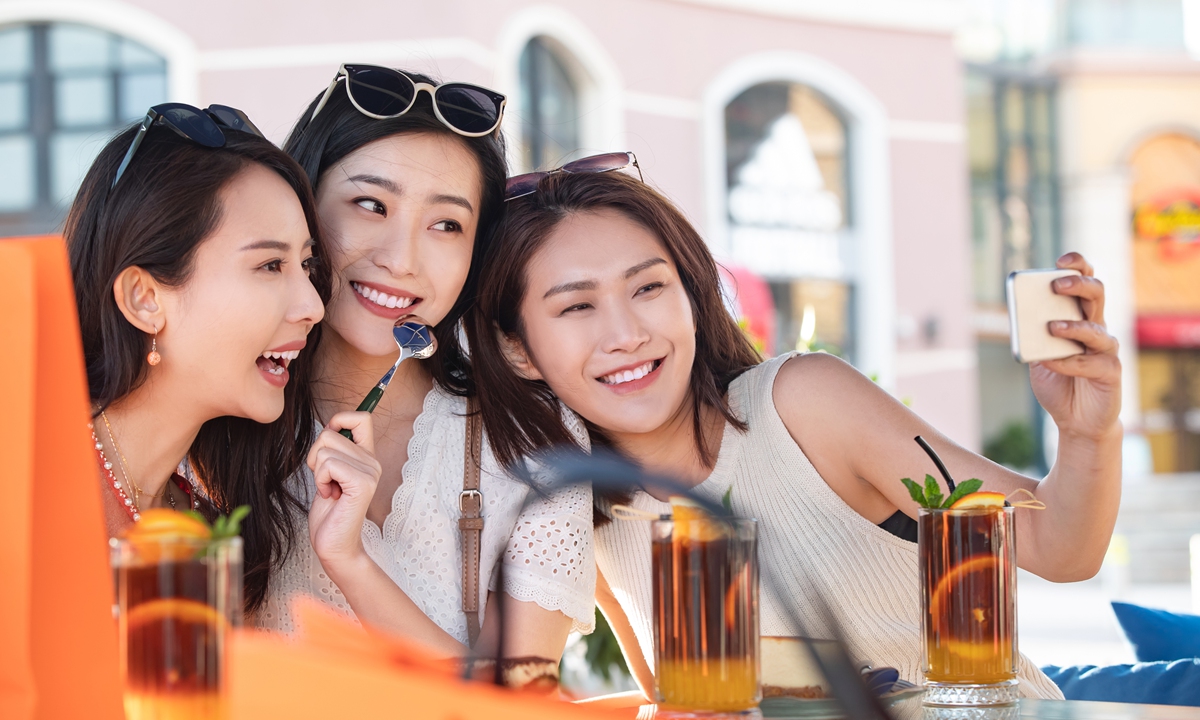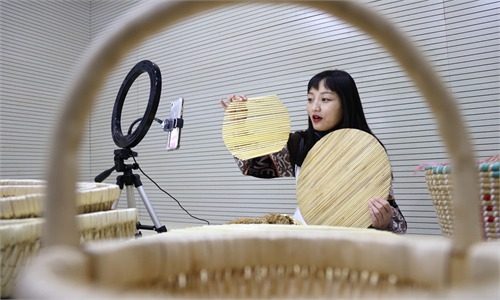IN-DEPTH / IN-DEPTH
Consumerism, fierce competition and false advertising lead to a boom of influencer culture in China
Social media fallacy

Photo: VCG
"He was a son of God... he must be about His Father's business, the service of a vast, vulgar, and meretricious beauty," this is how US writer F. Scott Fitzgerald describes the protagonist of his masterpiece The Great Gatsby.
The young Jay Gatsby found his humble family background unsatisfactory and dreamed, since childhood, of climbing the socioeconomic ladder, and after gaining fame and fortune, his mansions became nonstop party dens where gentlemen and celebrities alike indulged in orgies.
That was the Jazz Age of the 1920s when the US embraced the luxury, and hedonism. But were Gatsby alive today, he would have been surprised to find a kindred spirit alive and well, while being amazed at the way online influencers and socialites have made a name for themselves on China's digital social platforms.
However, unlike the traditional socialite with whom Gatsby was familiar, that once referred to a woman of distinguished birth and talent, the term, has now transformed into "influencer," seen a variety of downright disgraceful iterations emerging in China.
Feipanyuan, which roughly means "female flying frisbee socialite" in English, is the term given to female influencers who, like their Western counterparts, post photos of themselves and their lifestyles onto China's Instagram-like platform Xiaohongshu, or Little Red Book, and the Twitter-like platform Sina Weibo, and are often in seductive poses while wearing revealing or yoga clothes that fully show off their bodies' curves. Some have come to be considered by many netizens as posing either to expand their fan base or are expecting a strategy to secure a wealthy suitor.
In addition to feipanyuan, social networking platforms in China have spawned a number of controversial terms such as foyuan [Buddhist socialite] and pintuanyuan [team-buying socialite]. How did these concepts come about? Why do these so-called socialites go to such lengths to embellish lives in a unique and socially captivating way? What is the impact of such niche and sophisticated lifestyles when it comes to ordinary Chinese people?

Photo: VCG
Tasteless delicacy
''Flying frisbee' combines many pioneering elements such as socialization, flirtation, and exhibitionism, but it has nothing to do with sports," opined a blogger. A quick search for "flying frisbee" on Little Red Book will bring up a flood of posts about relevant content by young women in tight clothes with beautiful physiques.
"'Fly frisbee' posts are falsely tied to sports because it is easy to take beautiful, misleading photos while linking your activities to a healthy lifestyle. And on social media platforms, such topics are very popular and easily trend becoming a form of social currency," the blogger said.
In the eyes of feipanyuan critics, the flying frisbee's perceived athletic component has entirely been removed and has become a social interaction and profiteering tool.
According to The Paper, there are dating agencies that are in the business of "flying frisbee dating" and have very high requirements for their clients' age, appearance, educational accomplishments and acquired assets.
As to whether calling some women who play flying disc "feipanyuan" is a form of stigmatized hype, Chinese opinions are still divided. But it is undeniable that the origins of the term mingyuan, which in ancient China was used to praise the beauty of certain women, and has been popular since the 1930s in China, referred to a positive group of women who were elegant, graceful and good in social circles, has lost its luster in recent times.
Before feipanyuan, a popular term in 2021 was foyuan, referring to people seen as using Buddhist temples for attention and profit.
Such online influencers typically share social media posts depicting themselves performing "Buddhist activities", such as praying, meditation, or practicing calligraphy in temples.
These images are, however, highly incongruous, as, along with Buddhist robes, these socialites still manage to show off long floral dresses and hold their designer bags in a conspicuously. In short video clips, these influencers rarely talk about philosophical Dharma but rather use videos as avenues of self-promotion and the advertising of products tied to Buddhism.
In October 2020, an article titled "I lurked in Shanghai's 'mingyuan' WeChat group and became an observer for half a month" revealed a series of unbelievable phenomena: In order to get the "right shot," up to six group members can buy a Ritz-Carlton afternoon tea set for two people and take turns posing from the desirable location; 4 people each paid 1,500 yuan($225) monthly to rent an Hermes Kelly bag for exhibition purposes; 60 people each paid 100 yuan to rent a Ferrari; while a few people chipped in to buy a pair of second-hand Gucci stockings to wear them in turn for in pictures.
Although it is impossible to prove the authenticity of these extreme cases, the industry practice of "pretending to be rich" is really development in China. To achieve this, services including modifying a posting location to pretend that one is travelling around the world among others range from 5.99 yuan to 98 yuan, which is flooding China's social networks and shopping platforms.
The emergence of the ostentatious "mingyuan" is a product of commercialization and with the help of social media, online influencers create fake personas, creating a fake aesthetically pleasing lifestyle while making money from it, said Zhu Wei, a vice director of the Communication Law Research Center at the China University of Political Science and Law.
Although this kind of internet celebrity has cropped up all over the web, creating personas in various industries and fields such as sports and fitness, Buddhism, and medical care, one thing is clear - their posts lack originality and are clearly superficial, Zhu told the Global Times. "Some of the seductive, exaggerated and relatively overt expressions they use are just to attract people's attention and serve the purpose of commercial marketing," he said.

Photo: VCG
Eye-catching economy
"Once you open the Little Red Book, you will find yourself to be the poorest person in the world whereas if everyone has an annual salary of millions, in contrast, I do not know what kind of life I am living." In October 2020, Honest old aunt (screen name), a blogger with more than 130,000 followers on Little Red Book, said in a display of honesty to her anxious fans.
Honest old aunt surnamed Xu, whose main job is product operations for a leading internet platform in China, pointed out that in addition to "mingyuan," there are many people who share their exquisite lives, real or fake, on Chinese social media.
A large part of what is shown in those videos and postings is not real but performative. A foyuan taking pictures under the red walls of a temple might be a prim housewife in another life, she noted. "But high-end lifestyle and vulgar ugliness are both codes of wealth in the age of internet, when you get a high degree of attention, you will be approached by businesses to help market their products, then, the attention can be converted into cash."
Xu believed that it is not temptation but the current wave of consumerism and the fierce competition for content on social media platforms that have created the proliferation of so-called mingyuan and various online personas. "In China, socialites come and go, and as such must use one or two years to earn enough money to spend over the course of their lives," she explained.
Social network platforms are the main pushers of such kinds of "mingyuan" groups, Shi Gang, director of the Psychology Education Center of the China Agricultural University, told the Global Times.
Since chasing after profits is the main driving force of human interests, by producing a group of attractive "mingyuan" within such a context, you can easily cater to the fan economy, Shi said.
"Even when posting something that looks fake, for them, the ultimate goal is to generate profits by gaining online traffic. That means the more criticism they get, the more they can earn through these kinds of controversial commercial behaviors," he added.
Fake lifestyle
Coucoujane (screen name), a fashion blogger with 450,000 followers on Little Red Book, used to feel anxious because of the content posted online by her peers. "On social media platforms, everyone shows their best side, highlighting it through sensational headlines and beautiful covers," she told the Global Times.
Worse still, more young netizens today are using their imagination to guess the real state of socialites' lives through what they share, simply thinking that the life they don't have must be better. Then they slowly give up the opportunity to achieve something that might take longer to realize, and choose to indulge in temporary prestige and glamour, Coucoujane said.
Experts noted that such a phenomenon can negatively impact teens. With the tremendous improvement in living conditions, some Chinese youths have partially lost the spirit of hard work and are not willing to do too much hard work.
"I have found that some users on online platforms do not regard what the 'mingyuan' do as performative or entertainment, but as inspirational and something to aspire to. This is not the phenomenon most people want to see," Xu noted. That's why she called herself an "old aunt" on Red Little Book, a platform of exquisite beauty everywhere, and often appears without makeup on videos to share sincere insights into this current era of consumerism.
Observers and experts point out that China in the 2020s is unlikely to follow the same path as the US did in the past. "In the current internet commercial atmosphere, any forms of false publicity highlighted and orchestrated by public personas are doomed to fail," Zhu said.
In September 2021, both Douyin and Little Red Book announced the banning of several online influencers' accounts for misrepresenting themselves as Buddhist socialites for marketing purposes. The two platforms also deleted dozens of related posts and videos.
To maintain a clean internet environment and a positive community of "sincere sharing and friendly interaction," the Little Red Book issued an announcement on May 9 that accounts caught sharing posts flaunting their wealth will be punished according to the seriousness of the case or removed from the platform.
The current "mingyuan" in China is still in the stage of pleasing the public with claptrap flubdub. The controversies caused by them have showed that most of the Chinese public do not agree with the value of consumerism, experts pointed out.
According to Coucoujane's experience, a product's long term profitability does not lie in fancy promotion, but in the quality itself. Therefore, she strictly investigates and selects the brands she cooperates with in order to recommend them to her fans responsibly.
"I often share my experience with my fans on videos. In an era of materialism, we should have our own independent thinking and should not be slaves to flashy exteriors and material things," she said.

